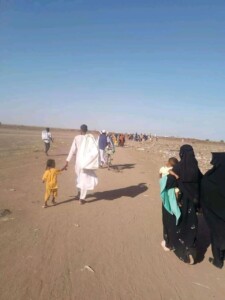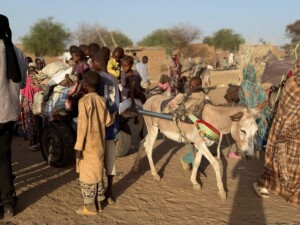Number of protest sit-ins growing in Sudan
Following the June 30 anti-junta Marches of the Millions that witnessed a huge turnout in more than 40 Sudanese cities and towns, activists in greater Khartoum set up a number of sit-ins, calling for democracy and the overthrow of the military junta. Wad Madani in El Gezira will follow on Tuesday. The Forces for Freedom and Change denied that they entered negotiations with the military.
 The sit-in at El Muassasa in Khartoum north on Sunday evening (Social media)
The sit-in at El Muassasa in Khartoum north on Sunday evening (Social media)
Following the June 30 anti-junta Marches of the Millions that witnessed a huge turnout in more than 40 Sudanese cities and towns, activists in greater Khartoum set up a number of sit-ins, calling for democracy and the overthrow of the military junta. Wad Madani in El Gezira will follow on Tuesday. The Forces for Freedom and Change denied that they entered negotiations with the military.
On Friday, groups of protesters were blocking streets in front of El Jawda Hospital in El Deyoum El Shargiya, south of the Khartoum city centre, in El Muassasa in Khartoum Bahri, and in Omdurman, between the El Azhari square and Wad Durro neighbourhood, and El Arbaeen street (renamed Martyr Abdelazeem street by the revolutionaries).
Resistance committees in El Rumeila and El Lamab started a fifth sit-in in Khartoum on Sunday, while the Resistance Committees Coordination of Wad Madani, capital of El Gezira, announced a sit-in on Tuesday.
The Marches of the Millions on Thursday were subjected to violent repression. Nine demonstrators were killed, and more than 600 others sustained various injuries in Khartoum, according the Central Committee of Sudanese Doctors. Hundreds of activists, including lawyers, were detained in various states, some for a short period, others are still being held.
Impact of the sit-ins
Opinions varied on social media about the effectiveness of the neighbourhood sit-ins and their impact on the overall situation. Many state that the large sit-in of 2019 has a very large impact because of its location in the centre of Khartoum in front of the army headquarters. Others fear that the sit-ins will be dispersed, as happened with the Khartoum sit-in on June 3, 2019, when more than hundred protesters were killed.
Journalist Durra Gambo however believes that “the sit-ins may reduce direct confrontations like the ones in the protest marches”.
She said on her Facebook page that the sit-ins give the revolutionaries the opportunity to stay with each other in one place for relatively long periods during which they can coordinate the next steps, in addition to more opportunities to seek safety.
Central Security Room
The Emergency Lawyers announced the formation of a special central room to follow up on the sit-ins and monitor human rights violations.
In a statement yesterday, the Emergency Lawyers said that they have prepared adequate monitoring and follow-up means for any attempt to target these sit-ins. They called on all emergency lawyers in all the different cities and towns of Sudan to join the Central Security Room in order to protect the sit-ins.
FFC adheres to the Three No’s
Like the Marches of the Millions and other street protest, the sit-ins demand the overthrow of the military putschists’ who took over power on October 25 last year and full civilian rule of the country. They adhere to the Three No's: “No negotiations, No bargaining, No legitimacy” (for the military junta), spokespersons for the Khartoum Resistance Committees told Radio Dabanga.
They said they intend to continue the sit-ins until the military have submitted “power to the people” though some of them expressed fears that the sit-in will be violently dispersed by security forces.
In a press conference on Saturday evening, the Forces for Freedom and Change-Central Council (FFC-CC) said they “stand with the street movement, the protest marches and sit-ins”.
Omar El Degeir, FFC-CC leading member and head of the Sudanese Congress Party, said “the rumours about an 80 percent agreement” with the military are incorrect. “We did and do not communicate with [those responsible for] the coup d’état. There is no political process possible withal this killing”.
He said that the mainstream FFC will continue to call for “a unified centre of the revolutionary forces”, and urged the international community “not to be equate the victim with the executioner”.











 and then
and then